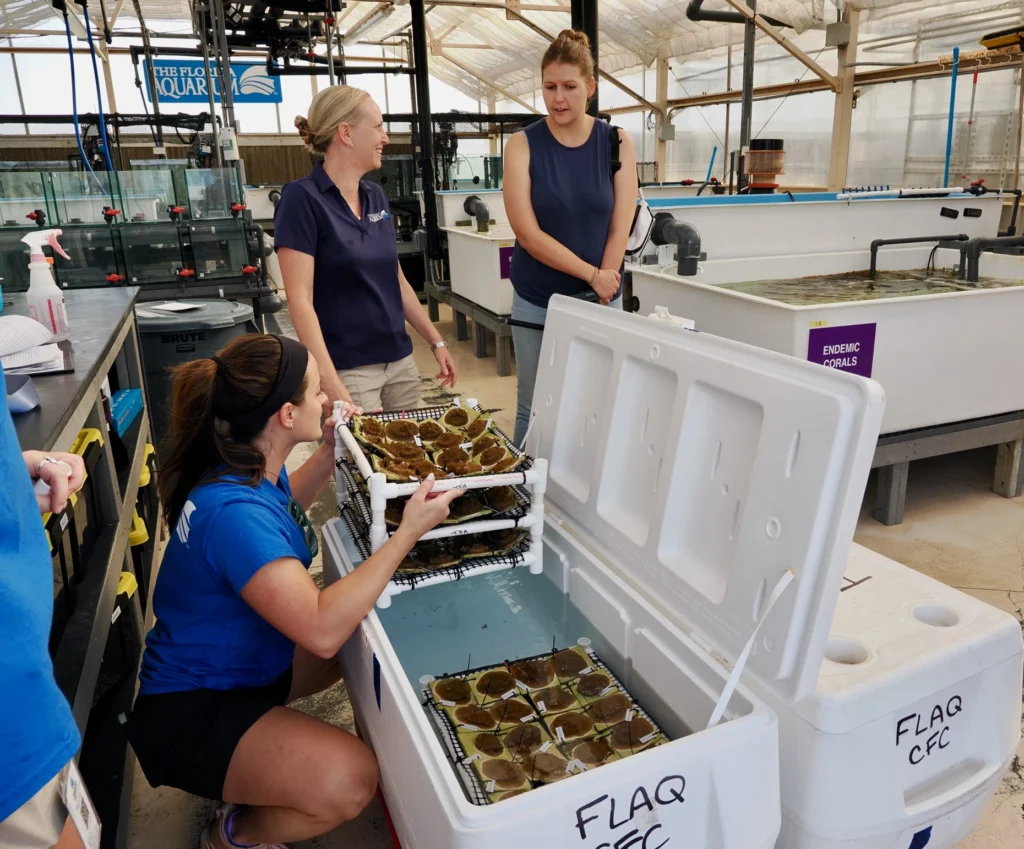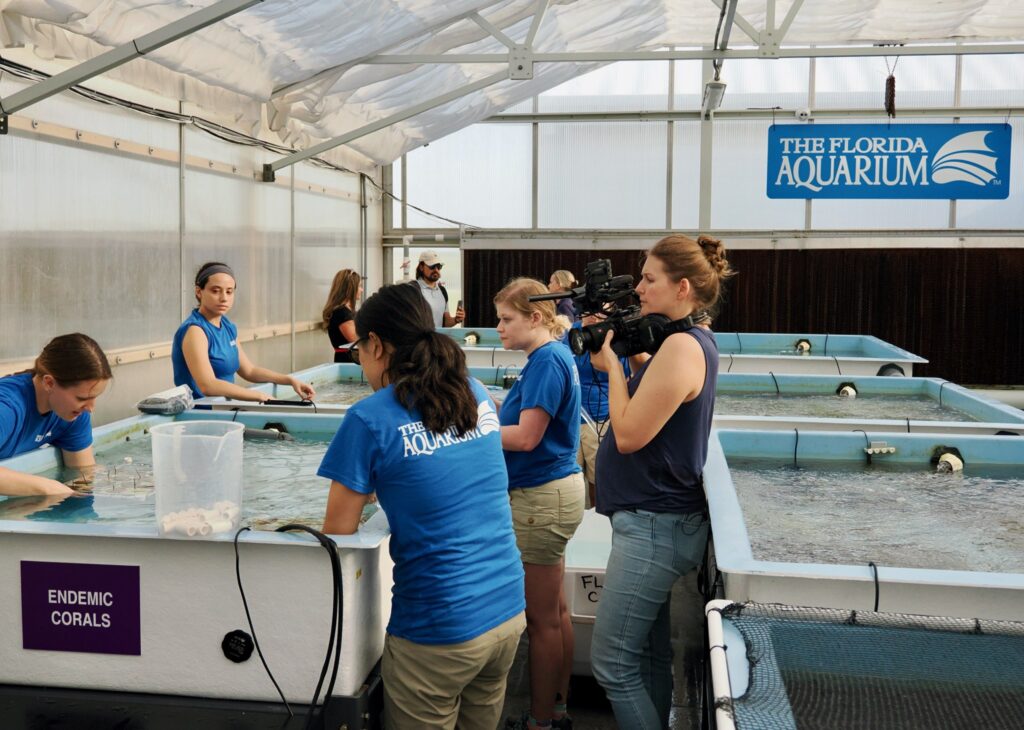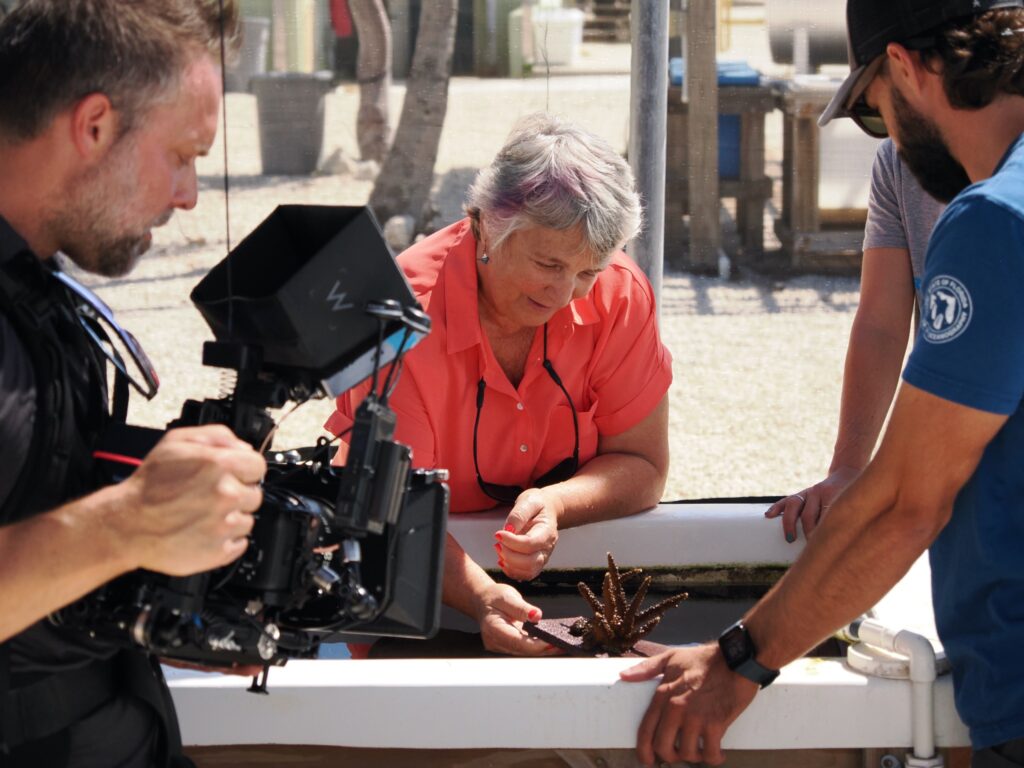By Noah Bookstein, Florida Student News Watch
Scientists, some in state-of-the-art labs and some in their backyards, are taking drastic measures to save coral from extinction.
Vital to marine life and, in turn, all life, coral reefs are bleaching and dying at rapid rates from warming oceans, pollution and the impacts of overfishing.
In a feature-length documentary, two Gainesville-based storytellers spotlight the scientists trying to save struggling coral reefs while grieving losses of their own.

In the upcoming documentary “Reef Keepers,” co-directors Natalie van Hoose and Alyson Larson explore the theme of eco-grief among a group of Florida-based researchers devoting their life’s work to studying and preserving coral reefs. Van Hoose, a freelance science writer, and Larson, a filmmaker, began filming in early May.
“Are coral scientists struggling too?” van Hoose said. The answer comes from a researcher who “cried in her dive mask,” and became the heart of the documentary.
“Reef Keepers” will take viewers on a coral relocation mission down Interstate 75, inside the hustle and bustle of Florida-based coral laboratories, and to the undersea reefs off the coast.
Behind the scenes, saving coral isn’t always high-tech.
“Some labs are in strip malls or backyards. It’s Florida scrappiness — wiring things together, mixing cement in Parmesan containers. That’s conservation sometimes,” van Hoose said.
The film will even include a look inside the homes of coral scientists to give viewers a glimpse of their personal lives.
In May, the filmmakers followed a rental truck transporting precious cargo – hundreds of coral “babies” from the Florida Aquarium that descended from parent colonies rescued from the ocean two years ago. These young corals made the 400-mile journey from Tampa to their new homes in the Florida Keys where restoration teams would either plant them directly onto degraded reefs or acclimate them in ocean nurseries before their final deployment to restoration sites.
“We snorkeled over a restoration site,” van Hoose said. “Hearing the shrimp (sounded) like Rice Crispies. Seeing coral wave — it didn’t feel real,” she said.
Corals are animals that house algae in exo-skeletal structures. The algae uses sunlight to grow and feed the coral, also giving coral its vibrant colors.

When ocean temperatures rise too high, heat stresses the corals who then expel their algae, turning the animals bone white in an often deadly process called bleaching, which stresses the corals to their limits. And like people, when coral are stressed, the creatures become more susceptible to disease, complicating any sort of survival and recovery processes.
In 2023, a record bleaching event occurred off the Florida coast when superheated water decimated the reef. Approximately 84% of the world’s corals were impacted by the heat, according to the National Oceanic and Atmospheric Administration.
The bleaching crisis forced scientists into a brutal reckoning. With reefs collapsing faster than expected, they realized they no longer had years to perfect solutions — corals needed immediate action.
“When a coral bleaches and loses its algae, it is basically starving,,” said Dr. Cindy Lewis, director of the Keys Marine Lab.
In the wake of the 2023 bleaching crisis, divers swarmed the University of South Florida-affiliated Keys Marine Lab on Long Key with coral, desperately trying to place the salvaged specimens into the lab’s temperature-controlled tanks which quickly reached capacity.
Teams sorted incoming corals by discarding dead tissue and saving whatever fragments they could. Scientists compared it to watching ER doctors respond to a mass casualty event.
“Some corals got tagged for ICU tanks, others were beyond saving,” Dr. Lewis said.
Deeper than data
Scientists spend years surveying the same coral individuals and for Dr. Lewis, it’s personal.
“You develop a relationship with these colonies, these magnificent, old, majestic colonies that can be hundreds, if not thousands of years old,” Dr. Lewis said. “It was really sad to watch them die.”

The filmmakers are putting human emotion at the center of the film. In conversations with scientists, that approach opens doors to allow scientists to share deeper vulnerability.
“They’d start sharing not just data, but why this work keeps them up at night,” Larson said.
For Dr. Lewis, that meant recalling the painful losses she experienced when dying coral flooded the lab in the summer of 2023.
“They made me dig deep into places I’d compartmentalized and closed off,” Dr. Lewis said. “It was bearing my soul to people I didn’t know very well.”
Larson saw parallels in the way scientists worked and felt about corals to her own experience as a parent.
“Scientists work like parents,” Larson said. “They’ll fight for corals as long as they can.”
Filmmakers captured surprising moments, including the sometimes scrappy nature of conservation work.
Filmmakers were stunned when they reviewed the underwater footage of cinematographer Frazier Nivens, who had been diving the reef for years and captured how the reef has declined over the last decade.
“Every Floridian has had the heart-sinking moment of going back to a place they loved and finding it unrecognizable,” van Hoose said. “The reef may never look the same, but watching these scientists’ dedication is a model for the rest of us: If they’re not giving up, why should we?”
The team’s goal is to finish this year and release the film in 2026. They are continuing to raise funds for the project’s completion.
You can visit the Reef Keepers website for more information.
Banner photo: Florida corals at The Reef Institute. More corals now live on land and in artificial coastal nurseries than in their native Florida waters where disease, extreme heat and bleaching have sent the reef into a dramatic decline (Credit: Reef Keepers). This story was originally edited by Florida Student News Watch mentor Max Chesnes. The piece was originally published at https://www.studentnewswatch.org/post/working-against-warming-to-save-coral-reefs.
Sign up for The Invading Sea newsletter by visiting here. To support The Invading Sea, click here to make a donation. If you are interested in submitting an opinion piece to The Invading Sea, email Editor Nathan Crabbe at nc*****@*au.edu. To learn more about coral bleaching, watch the short video below.



